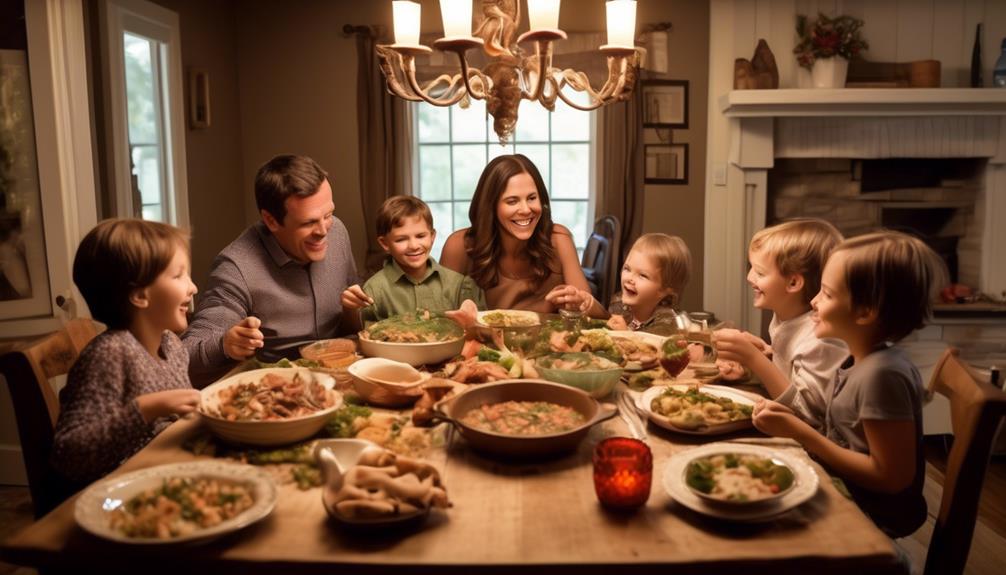Why Is Cultivating Strong Family Bonds at Home Important?
This post may contain affiliate links which means I may receive a commission for purchases made through links. As an Amazon Associate, I earn from qualifying purchases. Learn more on my Private Policy page.
Coincidentally, have you ever noticed how strong family bonds can influence every aspect of your life?
Cultivating strong family bonds at home is crucial for fostering a supportive and nurturing environment for everyone in the family. It's the foundation that shapes your relationships, attitudes, and overall well-being.
But why exactly is it so important?
Well, let's explore the numerous benefits and positive outcomes that come from prioritizing and strengthening these family connections.
Benefits of Strong Family Bonds

Cultivating strong family bonds at home leads to improved communication, greater resilience, and a sense of belonging for every family member. Positive reinforcement and emotional support are essential components of strong family bonds. When family members encourage and support each other, it fosters healthier relationships and improved well-being. Positive reinforcement involves acknowledging and appreciating each other's efforts and strengths, which can create a more positive and supportive family environment.
Emotional support within the family can significantly impact individual well-being. When family members provide emotional support to one another, they create a safe and nurturing environment where everyone feels valued and understood. This support system can help family members cope with challenges and stress, leading to improved mental and emotional health.
Furthermore, strong family bonds contribute to improved communication among family members. Open and effective communication is vital for maintaining healthy relationships. When family members feel connected and supported, they're more likely to communicate openly and honestly with each other. This can lead to a deeper understanding of each other's thoughts and feelings, ultimately strengthening the family unit.
Communication and Connection
Improving communication and fostering connection within your family is essential for building strong and healthy relationships. Effective listening is a fundamental aspect of communication that promotes understanding and empathy. It involves giving your family members your full attention, being present in the moment, and showing genuine interest in what they've to say. By actively listening to one another, you demonstrate respect and validate each other's experiences and emotions, which in turn strengthens the family bond.
Open dialogue is another crucial component of healthy family communication. It creates a safe space for everyone to express their thoughts, feelings, and concerns. Encouraging open dialogue allows each family member to feel heard and valued, fostering a sense of belonging and acceptance. It also promotes transparency and honesty within the family unit, building trust and deepening connections.
Creating opportunities for effective listening and open dialogue can be done through regular family meetings, dedicated bonding time, or simply by being fully present during everyday conversations. By practicing these communication skills, you can cultivate an environment where every family member feels comfortable sharing their thoughts and experiences. This, in turn, leads to stronger family bonds and a deeper sense of connection with one another.
Shared Family Activities

To continue strengthening family bonds, engage in shared family activities that foster connection and create lasting memories together. Bonding games provide an excellent opportunity for family members to interact, communicate, and work together towards a common goal. Whether it's a classic board game night, a scavenger hunt in the neighborhood, or a friendly sports competition in the backyard, these activities promote teamwork and cooperation while fostering a sense of unity and togetherness. Through these shared experiences, family members can learn to appreciate each other's strengths, support one another in their weaknesses, and celebrate victories as a team.
Additionally, family outings offer a chance to create cherished memories and deepen familial relationships. Whether it's a trip to the beach, a visit to a local museum, or a hike in the mountains, these outings provide an opportunity for families to bond in a relaxed and enjoyable setting. Sharing new experiences and exploring different places together can strengthen the family bond by creating shared memories and moments of joy. These outings also provide a break from routine and allow families to focus on each other without the distractions of daily life.
Incorporating bonding games and family outings into your regular routine can significantly contribute to building strong family bonds and creating a sense of belonging and unity within the family. So, gather the family and engage in activities that foster connection and create lasting memories together.
Nurturing Trust and Respect
Nurturing trust and respect within your family dynamic is fundamental for fostering strong and meaningful relationships. Building empathy is a crucial aspect of this process. When family members empathize with each other, they're better able to understand each other's perspectives and emotions, leading to stronger and more supportive connections. Encouraging open and honest communication is key to fostering empathy within your family. By actively listening to each other and validating each other's feelings, you can build a foundation of trust and respect.
Another important element in nurturing trust and respect within your family is promoting independence. Allowing each family member the space to express themselves, make decisions, and pursue their interests fosters a sense of autonomy and self-worth. This independence also encourages mutual respect, as each person's individuality is acknowledged and valued within the family unit. When family members feel respected and supported in their individual pursuits, they're more likely to reciprocate these feelings, leading to a harmonious and trusting environment.
Resolving Conflict Positively

When conflicts arise within your family, applying the empathy and respect cultivated in your relationships can lead to positive resolutions and strengthened bonds. Conflict resolution is a crucial skill in maintaining healthy relationships. Here are some strategies to help you resolve conflicts positively:
- Active Listening: When conflicts arise, make an effort to actively listen to the other person's perspective without interrupting. This demonstrates respect and understanding, laying the foundation for a more constructive conversation.
- Open Communication: Encourage open and honest communication within your family. Create a safe space where everyone feels comfortable expressing their thoughts and feelings without fear of judgment.
- Seek Compromise: Instead of focusing solely on winning the argument, strive to find a compromise that addresses the concerns of all family members. This fosters a sense of cooperation and mutual respect.
- Empathy and Understanding: Put yourself in the other person's shoes to better understand their feelings and motivations. Recognizing and acknowledging their perspective can lead to more empathetic and compassionate interactions.
- Healthy Conflict Resolution Models: Familiarize yourself with effective conflict resolution models that can guide your family through difficult conversations. Having a structured approach can help prevent conflicts from escalating and promote a more positive outcome.
Building Emotional Resilience
Building emotional resilience requires developing healthy coping mechanisms and adaptive strategies to navigate life's challenges. In times of difficulty, emotional support from family plays a crucial role in helping you build resilience. The ability to bounce back from setbacks, adapt to change, and cope with stress is essential for overall well-being. Your family can provide a safe space for you to express your emotions and receive the support you need to develop resilience.
Coping strategies are fundamental in building emotional resilience. Your family can help you learn and practice effective coping mechanisms such as problem-solving, positive reframing, and seeking social support. By observing and engaging in healthy coping behaviors within the family unit, you can develop the skills needed to navigate adversity in the future. Additionally, learning to regulate emotions and manage stress within the family environment can greatly contribute to your emotional resilience.
Furthermore, the bond you share with your family can serve as a source of strength during challenging times. Knowing that you have a support system at home can provide a sense of security and comfort, which is foundational in developing emotional resilience. Open communication, empathy, and mutual understanding within the family foster an environment where emotional support is readily available, contributing to your ability to bounce back from hardship.
Creating Family Traditions

To fortify family bonds and enrich emotional resilience, consider establishing meaningful family traditions that foster connection and create lasting memories. Family traditions play a crucial role in strengthening the bond between family members and creating a sense of belonging. These traditions can be anything from simple daily routines to elaborate annual celebrations. They provide a sense of stability and consistency, nurturing a strong family identity and deepening the emotional connections among family members.
- Meaningful Rituals: Introduce regular family rituals such as Sunday brunches, movie nights, or game evenings. These rituals offer dedicated time for family members to come together, share experiences, and communicate openly.
- Bonding Activities: Engage in activities that promote togetherness, such as cooking together, gardening, or participating in sports. These activities not only create opportunities for bonding but also help in creating shared experiences and memories.
- Generational Legacies: Embrace and celebrate family history by passing down stories, recipes, or skills from one generation to the next. This enriches the family's collective identity and instills a sense of pride in its heritage.
- Holiday Customs: Establish unique customs and traditions for holidays and special occasions. Whether it's a specific way of decorating the house for festivities or engaging in charitable activities as a family, these customs create a sense of anticipation and joy, strengthening the family's emotional connection.
- Special Milestone Celebrations: Create traditions around celebrating significant milestones such as birthdays, anniversaries, or achievements. These rituals provide opportunities for expressing love and appreciation, and they become cherished memories for years to come.
Fostering a Sense of Belonging
Creating a strong sense of belonging within your family can be achieved through intentional and inclusive traditions that affirm each member's importance and connection to the family unit. Family support plays a crucial role in fostering this sense of belonging. When each family member feels supported and valued, it creates a foundation of emotional connection that strengthens the family bond.
To foster a sense of belonging, it's important to create an environment where every family member feels heard and understood. Encourage open communication and active listening within your family. This creates a space where individuals feel valued and accepted, strengthening their emotional connection to the family unit. Additionally, engaging in activities that promote teamwork and collaboration, such as family game nights or outdoor adventures, can help reinforce the idea that every member plays a vital role in the family dynamic.
Family support and emotional connection go hand in hand when it comes to fostering a strong sense of belonging. Providing a support system that's rooted in empathy and understanding is essential for creating a safe and nurturing environment for all family members. This support system can be demonstrated through acts of kindness, encouragement, and being present for one another during both challenging and joyous times.
Ultimately, fostering a sense of belonging within your family involves actively nurturing the emotional connection between all members while providing unwavering family support. When each individual feels valued, understood, and supported, it strengthens the family bond and creates a lasting sense of belonging.
Frequently Asked Questions
How Can Strong Family Bonds at Home Impact a Child's Academic Performance and Success in School?
Strong family bonds at home can significantly impact your academic motivation and success in school. When parents are involved in your education and provide a supportive environment, it can boost your confidence and drive to excel academically.
What Are Some Practical Ways to Prioritize Family Time and Bonding in a Busy, Modern-Day Family Schedule?
To prioritize quality family time, plan regular family activities like game nights or outdoor adventures. Creating family rituals, such as cooking together or having a weekly movie night, can strengthen family bonds amidst a busy schedule.
How Do Strong Family Bonds at Home Affect a Child's Social and Emotional Development?
Strong family bonds at home significantly impact your child's mental health and emotional intelligence. When parents prioritize quality time, open communication, and support, it fosters a sense of security and belonging, laying a solid foundation for healthy development.
What Are Some Strategies for Strengthening Family Bonds When Family Members Have Conflicting Schedules or Live Far Apart?
To strengthen family bonds when schedules clash or distance separates, prioritize regular communication through calls or video chats. Plan visits when possible, and use technology creatively to share experiences. Long distance bonding and synchronized schedules can still foster closeness.
What Role Do Extended Family Members, Such as Grandparents or Aunts and Uncles, Play in Cultivating Strong Family Bonds at Home?
Extended family members, like grandparents and aunts, play a crucial role in cultivating strong family bonds at home. They contribute through family traditions, fostering sibling relationships, and adding value to family gatherings, creating lasting memories for everyone involved.
Conclusion
So, make sure to prioritize building strong family bonds at home.
By communicating openly, participating in shared activities, and nurturing trust and respect, you can create a positive and supportive environment for your family.
Resolving conflicts positively and fostering emotional resilience will also help your family grow closer.
Creating traditions and fostering a sense of belonging will strengthen your family's bond and create lasting memories for years to come.
Take the time to invest in your family relationships, it's worth it.
